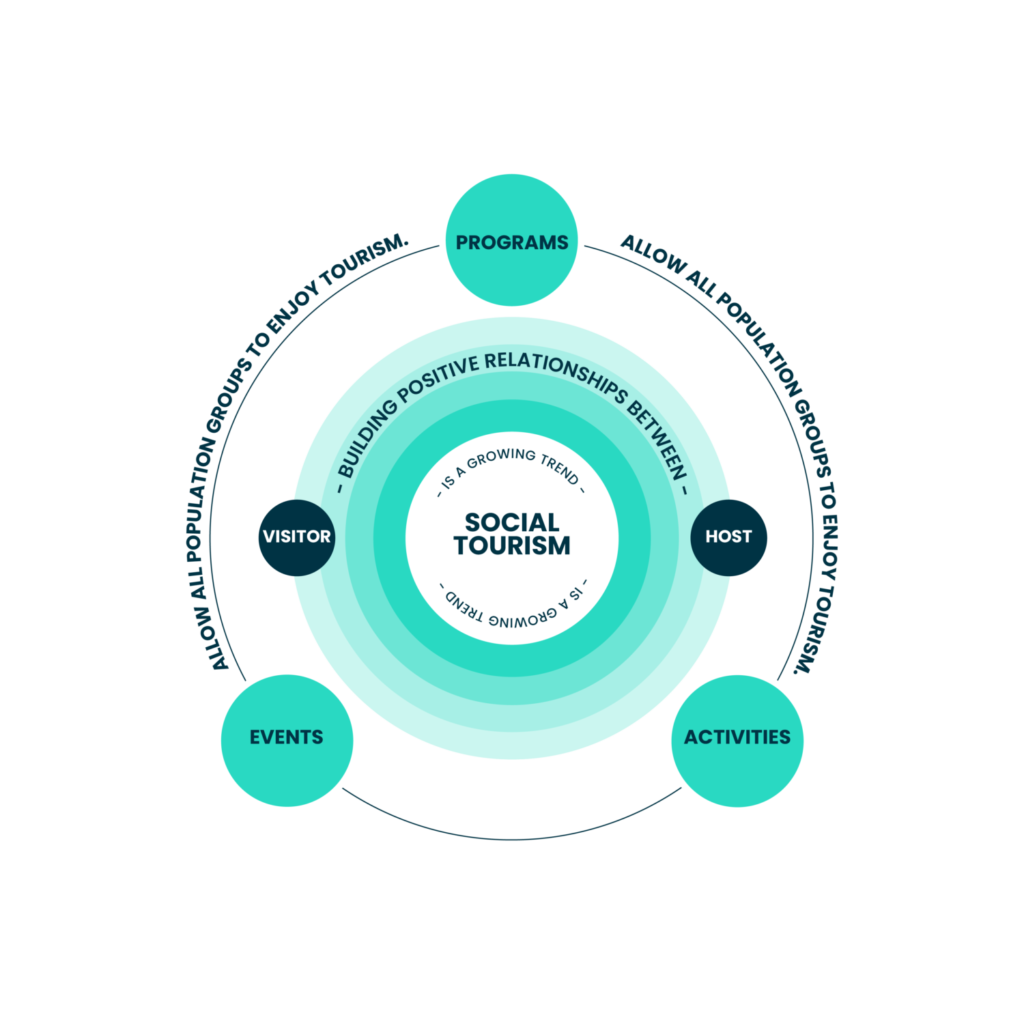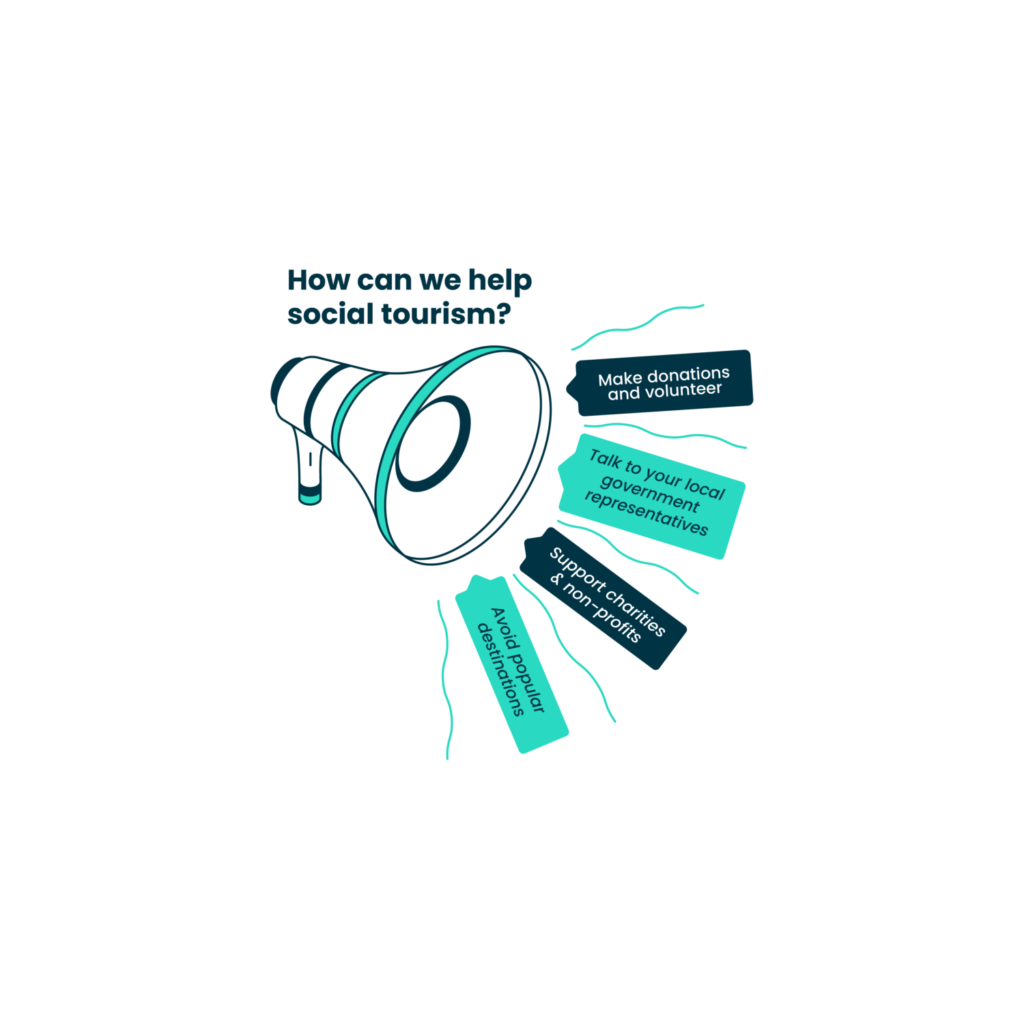What Does Social Tourism Mean and How it is Redefining Travel?

The tourism industry offers an abundance of benefits. It encourages economic growth, creates jobs, and brings massive amounts of revenue to some of the most popular tourism destinations. However, it’s not always beneficial directly to the local communities, and it’s not always accessible to all.
On average, from every $100 spent by travelers in developing countries, only $5 stays in the local economy, resulting in significant tourism leakage. The widely-adopted traveling practices such as booking hotel accommodations, buying mass-produced souvenirs, or choosing international food chains rather than local restaurants often cause long-term harm to the community.
Not to mention the issues of over-tourism that disrupts the daily life of the locals, increases pollution, and harms the environment.
Fortunately, trends are changing in the tourism sector. Travelers are becoming increasingly aware of the consequences of over-tourism and how this issue is impacting the destinations they visit – which is why more and more people are starting to adopt social and sustainable tourism.
Social tourism is a growing trend that prioritizes building positive relationships between visitors and host communities and developing “programs, events, and activities that allow all population groups to enjoy tourism”.
Take a look below to learn what social tourism entails and how it’s redefining travel.
What does social tourism mean?
Social tourism is a broad concept that encompasses countless events and activities. Different holiday types, such as working holidays, for instance, can fall under the category of social tourism. Activities you engage in at the destination, the type of destination you choose, and even the type of accommodation you book or some unique client group a tourism organization works with could all be labeled as social tourism.

In a nutshell, social tourism focuses on providing economic, social, and cultural benefits to travelers and their host communities.
On the one hand, travelers can participate in social tourism by contributing to their destinations – volunteering, participating in local projects, helping build homes for disadvantaged local groups, supporting local artists and crafters, donating, and more.
On the other hand, some travelers can be the beneficiaries of social tourism. Countless government and private tourism organizations provide travel opportunities to those groups that wouldn’t otherwise be able to enjoy traveling – impoverished families, people with disabilities, children, and seniors, for instance.
Moreover, some popular travel destinations are starting to invest in building a more accessible infrastructure that improves the traveling experience for all. You’ll find wheelchair-accessible beaches in Cyprus, braille-etched railings at Castel Sant’Elmo in Naples, and “touchable paintings” at museums worldwide.
Considering that social tourism can take many forms, it’s not surprising that it’s known under many different names – sustainable tourism, accessible tourism, tourism for all, enlightening tourism, and responsible tourism, among others.
How is it usually financed?
Social tourism can be financed in one of several ways, depending on its particular type. If you want to contribute to the destination you’re visiting, you’d most commonly have to finance any activities and events you participate in out of pocket.
You could join a charitable organization that covers expenses for certain activities, such as building homes for the locals, for instance, where it might cover the costs of the materials. However, you’d still likely have to pay for any other travel-related expenses yourself – accommodation, transportation, food, and more.
Social tourism events and activities for children, impoverished families, people with disabilities, and others, on the other hand, are most commonly fully financed by local and federal governments, employers, non-profit organizations, and charities. On occasion, the participants could even receive a small spending allowance that enables them to fully enjoy their travels.
What is the objective of social tourism?
The main objectives of social tourism include:
- Supporting local communities – leaving a positive mark on the communities in your travel destinations;
- Discovering new destinations – visiting places off the beaten path and going to less traveled-to countries;
- Learning about new cultures – getting to know the locals, their languages, cultures, traditions, and history;
- Providing economic benefits to host countries – shopping local, investing in arts and crafts from the local artists, improving the local economy;
- Making travel accessible to all – allowing everyone to experience the wonders of traveling, regardless of their socio-economic group, age, health, or more.
Ultimately, the main goal of social tourism is connecting travelers with their host countries, helping build international relationships, and making travel more enjoyable and more responsible.
How can we help social tourism?
There are multiple ways to promote and support social tourism:

- Support charities and non-profits – many social tourism charities rely on contributions from individuals to create immersive programs and activities that help tourists and host countries;
- Make donations – donate to relevant organizations that support local communities in your favorite travel destinations or those that offer travel opportunities to underprivileged groups in your area;
- Volunteer – join volunteer groups that connect you with locals;
- Avoid popular destinations – go off the beaten path and travel to lesser-known destinations;
- Talk to your local government representatives – as many social travel activities are government-funded, you can talk to the local representatives to find the best ways to support social tourism.
You don’t have to go out of your way to support social tourism. Even minor changes to your typical traveling habits could help – booking accommodation with a host family instead of a hotel, buying souvenirs from local artists, eating at small local restaurants, recycling while traveling, and more.
Real-life examples
As evidenced so far, Social Tourist isn’t just a Charlie D’Amelio’s apparel brand. It’s an increasingly important concept that presents immeasurable benefits to travelers and their host communities. Therefore, it’s not surprising that we’re seeing more and more real-life examples of social tourism.
Take a look at just a few organizations that are helping make social tourism mainstream.
Make a Difference (MAD) Travels
Make a Difference (MAD) Travels is a unique social entrepreneurship based in the Philippines. It offers sustainable, one-of-a-kind travel experiences to international tourists who want to make a difference. It focuses on building relationships between travelers and their destinations of choice, leading exciting off-the-beaten-path tours, introducing travelers to the local cultures, and offering educational courses and experiences.
What’s more, MAD Travels enables you to support local communities even from a distance. You can support communities in Zambales or Rizal by gifting a tree planted on your behalf or shopping for local Filipino products like organic honey or bamboo straws directly from the Mad Travels site.
Awaken
Awaken is all about traveling with a purpose. Based in Ecuador, it started as an at-risk youth foundation and has evolved into a social tourism organization that helps you support the communities you visit while enjoying immersive travel experiences.
The organization’s main aim is to support children and their parents who come from juvenile detention centers and immerse them back into society. By joining one of Awaken’s programs, you can travel to some of Ecuador’s most mesmerizing destinations, join volunteer groups, go on active tours, and learn all about the local people, culture, and history.
Invisible Cities
Invisible Cities is a UK-based social enterprise that supports homeless people through travel. Currently available only in some of the biggest cities in the UK, including Glasgow, Manchester, Edinburgh, Cardiff, and York, it helps teach homeless people how to become walking tour guides in their cities.
Invisible Cities offers comprehensive skill-building training and encourages its guides to deliver authentic tours focusing on the monuments and locations they have chosen.
The organization aims to dispel myths and stereotypes regarding homelessness and improve the lives of those impacted by it.
Operation Groundswell
Operation Groundswell offers immersive programs across Central and South America, East Africa, and Asia, redefining backpacking experiences and allowing you to get truly immersed in the cultures you’re exploring.
Started by a group of backpacking enthusiasts, it’s grown to be one of the largest organizations of its kind. You can join open, pre-planned programs or even design your own custom experiences. Choose the regions you want to visit, select the theme you’d like to learn more about (such as human rights, health, environment, or education), and design an active holiday you’ll never forget.
Good Travel
Good Travel promotes travel experiences that lead to a positive social, economic, and environmental impact. To that end, the organization collaborates with local businesses that give back to their communities, partners with international non-profit organizations, and donates to countless global charities.
Each trip is designed to fit the Good Travels ethos, offset our carbon footprint, support marginalized groups, boost the local economy, and deliver memorable travel experiences.
Although there are many pre-planned trips to countries like Peru, New Zealand, Fiji, and others, you can also develop a personalized itinerary that suits your traveling preferences.
Okavango Craft Brewery
Okavango Craft Brewery in Northern Botswana is a unique addition to the list. Not specifically created as a social tourism organization but rather a great local brewery with a cause, it enables you to support Okavango’s people and elephants and enjoy good beer made from locally-sourced ingredients.
As you enjoy your dinner and drinks, you’ll help the brewery support the NGO EcoExist non-profit organization that helps promote a sustainable existence between farmers and elephants in areas with high elephant-human conflict. If you’re traveling in the area, pay the brewery a visit to help support the farmers that allow you to enjoy local beers.
Have Fun Do Good
Have Fun Do Good (HFDG) is an organization developed for adventure-seekers who want to do good on their travels. Whether staying close to home or traveling to far-off destinations, HFDG helps you create immersive travel experiences and join volunteer programs that enable you to make a difference.
You’ll get to meet new people, explore beautiful locations, learn about new cultures, and support international charities.
HFDG offers small group travel experiences and corporate events that can improve your team-building and help your business support good causes.
International Social Tourism Organisation (ISTO)
International Social Tourism Organisation (ISTO) is one of the largest (and oldest) social tourism non-profits, established in 1963. It promotes responsible, accessible tourism for all that benefits individuals and communities across the globe.
The organization has five primary goals to improve:
- Accessibility;
- Fair business;
- Environment;
- Solidarity;
- Quality of life.
ISTO aims to make leisure, holidays, and tourism accessible to all – the youth, seniors, people with disabilities, and others. It partners with local businesses and governments to create opportunities for everyone to enjoy tourism without limitations while simultaneously supporting and benefiting the local populations, their cultural heritage, and their environment.
Elevate Destinations
Elevate Destinations operates under the belief that travel is sacred, and as such, it should always have a positive social and environmental impact. Therefore, it offers memorable travel experiences that help you find greater meaning in the world while connecting with coglobal communities, supporting the environment, and preserving our natural surroundings.
Elevate Destinations offers immersive, family-friendly trips, adventurous travels for adrenaline-seekers, learning journeys, charity challenges, donor travel experiences, and more for individuals and organizations alike.
Moreover, it’s developed a new travel program, “Buy a Trip, Give a Trip”, that allows you to support local youths. The program gives local children an opportunity to visit some of the most popular tourist sites in their own countries.
Responsible Travel
Last but certainly not least is Responsible Travel, an organization that focuses on nature preservation and empowering local communities. It prioritizes responsible travel, reducing carbon emissions, developing accessible travel opportunities, and organizing volunteer events that allow you to give back to the communities you’re visiting.
It also has a “Trip for Trip” program that allows you to send a disadvantaged child on a day trip when you book your own holiday, all at no additional cost.
Final thoughts
Social tourism is quickly taking off, becoming one of the biggest tourism trends of the decade. Allowing you to visit some of the most astonishing destinations, support your host communities, preserve nature, and make travel accessible to all, social tourism is making a world of difference one trip at a time.
Subscribe to
our newsletter
Yay! You are now
subscribed to our
newsletter
Mize is the leading hotel booking optimization solution in the world. With over 170 partners using our fintech products, Mize creates new extra profit for the hotel booking industry using its fully automated proprietary technology and has generated hundreds of millions of dollars in revenue across its suite of products for its partners. Mize was founded in 2016 with its headquarters in Tel Aviv and offices worldwide.
Related Posts

30 Most Important Travel Industry Events for 2024
30 min. Social share: 2024 is packed with must-attend travel industry events. Stop by to discover all relevant events conveniently grouped by continents with listed dates, themes, and locations! Many travel industry experts believe that travel industry events play a pivotal role in shaping the future of the travel industry. Why is this so? It’s […]

Empowering Equality: Mize Leads the Way in Travel Technology
7 min. Are we all equal? Are we all equally represented in the business world? In some professional sectors, there might still be some under-representation of women, minorities, and the LGBTQIA+ community. The tech sphere is no different, but is the travel tech sector a spark of hope? As the business world becomes more diverse, […]

Slow Tourism Case Studies: Examples to Truly Understand Slow Tourism
14 min. The tourism industry is moving at an ever-accelerating pace. That’s because the tourism industry is perhaps one of the verticals that depend on the most factors. One of the main factors that affect it is social movements, given that tourism brands of all sizes always cater to the needs of consumers. One of […]
